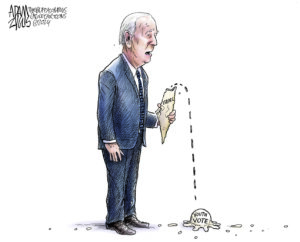A New Battle Over Resources in Israel
The Knesset approved a law late last month drastically increasing taxes on Israel’s mammoth, newly discovered offshore natural gas reserves.
The Knesset approved a law late last month drastically increasing taxes on Israel’s mammoth, newly discovered offshore natural gas reserves. The vote should have been a clean victory for a coalition movement calling for broad socioeconomic change in the Jewish state, but powerful right-wing blowback weakened the bill in a saga eerily similar to the stripping down of President Barack Obama’s health care plan and the hollowing out of economic reforms in the United States.
The Sheshinski Law, which will double the tax on oil and gas to more than 50 percent in the near term and raise the level to as high as 62 percent later, passed by a landslide 78-2 vote after vigorous debate in the national legislature and the society as a whole.
The lobby behind the bill, made up of both left and right, was led by the Israel Civic Action Forum, which has been calling for profits from Israel’s only major natural resource to be used to help the poor and strengthen social programs. The bill came on a wave of strikes and demonstrations throughout the country in which workers from across the spectrum (nurses, social workers, prosecutors and foreign ministry employees, to name just a few) protested low pay and rising prices, forcing the government of Benjamin Netanyahu to raise the minimum wage.
A report of the international Organisation for Economic Co-operation and Development last year found Israel to have the highest poverty rate in the developed world (2.5 times the average) and the second-highest gap between rich and poor. An onslaught of neoliberalism is largely blamed for the problems, and the Israel Civic Action Forum is a reaction to economic policies seen as benefiting the rich at the expense of the poor. Prime Minister Netanyahu has cut income and company taxes while raising value-added taxes, lowering the purchasing power of the poor, who don’t benefit from a cut in income taxes (half of all income earners in the country don’t reach the tax threshold). The poor are also simultaneously forced to cope with water prices that have jumped 33 percent in two years (the utility is undergoing a broad privatization process), as well as with rising housing, gas and electricity prices.
“In Israel, there is such a close relationship between the government and tycoons, but we won because there was a public campaign,” said Rabbi Michael Melchior, founder of the forum and also a Meimad party member and a former Knesset member known for unifying left-wing ideals with the tenets of Orthodox Judaism.
“It’s still not finished, it’s not optimal, there were a lot of compromises, but it’s about fair share versus endless greed that has no comparison.”
Last year, 16 trillion cubic feet of gas was found at the Leviathan field in Israel’s Mediterranean waters, one of the largest offshore gas finds in the last 10 years. In 2009, the United States Geological Survey estimated there was 120 trillion cubic feet of gas under the eastern Mediterranean. Israel has staked a claim to much of the area in question; Lebanon also claims part of it.
Ever since the discoveries, a growing number of Israelis have demanded that their government change its policy of light taxes on natural resources, which until the Sheshinski law were among the world’s lowest, at 24 percent. The debate surrounding the law was so fierce that when economics professor Eytan Sheshinski suggested taxes should be higher, he was accused of plotting to push international investors into the hands of Lebanon and Hezbollah. The campaign against Sheshinski was the work of the oil lobby and die-hard supporters of the far-right Yisrael Beiteinu party as well as key members of the Likud Party. The lobby has blocked changes to the 1952 Oil Law twice over the last 10 years, and opponents of the law have argued that because the gas has already been discovered, the rules cannot be changed “retroactively.” The ploy was too transparent to succeed, but the campaign did soften the law with a significant loophole.
Hours before the vote, the Knesset finance committee revised the bill to except the minister of infrastructure, Yisrael Beiteinu’s Uzi Landau, from having to report data on gas finds to tax authorities. Landau had shown his true colors earlier in the debate by saying Lebanon risked a war with Israel for trying to claim gas reserves in its territorial waters.
Shir Hever, an economist with the Alternative Information Center, has no doubt that Landau will help the gas companies avoid the full brunt of the new taxes by hiding the extent of the reserves exploited.
“It would be naive to assume that the companies will volunteer to pay the full amount when they can easily give distorted reports,” he said. “If it comes to court, the companies can always claim that it’s a matter of interpretation and not willful concealment of information.”
For Hever, the law does not herald a change in Israel’s social policies and the ordeal actually shows how “corrupt and divided” his country has become.
“Suddenly, calling for more resources for the state through taxation of capitalists is considered ‘not patriotic,’ as if the capitalists are the ‘real’ Israel.”
But for now, those behind Sheshinski’s recommendation remain optimistic.
Meimad’s Melchior said much of the income will be put in a national fund to be used to enact “sweeping economic and social reforms,” adding that Israelis had long agreed that such spending was necessary. “But they’ve said in the past that we have to pay money for security and defense, and we don’t have resources … but now we’ll have [heavy funding] over a long period.”
Melchior looks to the Norway model, in which the interest from a fund containing the country’s vast petroleum income pays for its vaunted social welfare programs. Melchior and the forum want to have the money in Israel pay for better education, health, welfare, senior benefits, housing, environmental protection and public transit, as well as for programs dedicated to bringing full equality to the country’s Palestinian Arab citizens.
Though critics claim the law doesn’t go far enough (the forum had advocated that 80 percent of profits go to the state), and the financial committee was able to corrupt the bill with the Landau loophole, it is not impossible that funds provided by the new tax policy could help close socioeconomic gaps if used properly.
The hope is that the movement does not quiet down. It will be up to activists to avoid a repeat of the outcome of the March social workers’ strike, which ended without major gains being made by the workers.
“We started the Israel Civic Action Forum 11 months ago so there would be no shady deals in closed dark rooms — the whole public would be there,” said Rabbi Melchior. “We will continue to follow this, every step of the way; nobody’s going to get away with not doing their obligations.”
Your support matters…Independent journalism is under threat and overshadowed by heavily funded mainstream media.
You can help level the playing field. Become a member.
Your tax-deductible contribution keeps us digging beneath the headlines to give you thought-provoking, investigative reporting and analysis that unearths what's really happening- without compromise.
Give today to support our courageous, independent journalists.






You need to be a supporter to comment.
There are currently no responses to this article.
Be the first to respond.